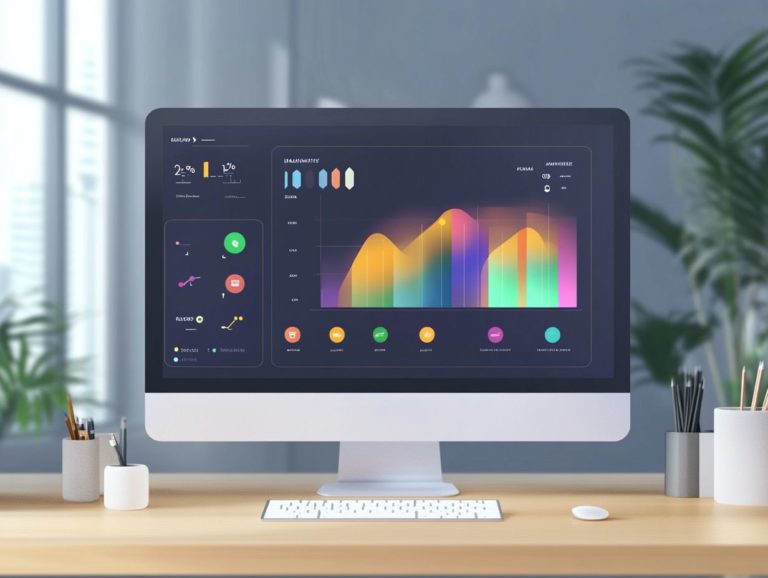Performance Management Tools: Enhancing Team Collaboration
In today s fast-paced work environment, effective performance management tools are essential for fostering collaboration and enhancing productivity.
These tools not only streamline communication but also offer valuable insights into team dynamics and individual contributions.
This article delves into the myriad types of performance management tools at your disposal, highlighting their benefits and best practices for implementation.
You ll discover real-life case studies that showcase the successful application of these tools, illustrating their profound impact on team performance.
Join us as we explore this vital aspect of workplace management!
Contents
- Key Takeaways:
- Why You Need Performance Management Tools
- Types of Performance Management Tools
- Implementing Performance Management Tools
- Case Studies: Successful Implementation of Performance Management Tools
- Frequently Asked Questions
- What are performance management tools and how do they enhance team collaboration?
- Which specific tools fall under the category of performance management?
- How can performance management tools help identify and address team collaboration issues?
- What are the benefits of using performance management tools to enhance team collaboration?
- How do performance management tools promote accountability within teams?
- Can performance management tools be customized to fit the unique needs of a team or organization?
Key Takeaways:

- Performance management tools can improve team collaboration by providing a centralized platform for communication and project management.
- These tools can also enhance performance and productivity by tracking and evaluating individual and team performance.
- When implementing performance management tools, consider factors such as team needs and best practices for successful implementation.
What are Performance Management Tools?
Performance management tools are essential for any organization looking to elevate team collaboration and streamline project management. Utilizing performance management tools: essential training resources can further enhance these efforts.
Tools like Microsoft Teams, Slack, and ProofHub integrate diverse functionalities that enable agile teams to reach their organizational objectives.
By utilizing platforms such as Monday.com and Trello, you can effectively manage performance reviews assessments that evaluate employee work contributions set precise goals, and provide real-time feedback for ongoing improvement.
Beyond these core capabilities, performance management tools are pivotal in fostering open communication, essential for cultivating strong workplace relationships.
They enable seamless collaboration among team members, ensuring that everyone stays informed and aligned with project objectives.
These platforms also support employee development through skills tracking and personalized growth plans, giving individuals the opportunity to take charge of their professional journeys.
When organizations harness these tools wisely, they create an environment that nurtures talent and propels collective success forward.
Why You Need Performance Management Tools
The advantages of employing performance management tools are extensive and profoundly influential, especially for improving team collaboration and fostering communication among employees.
By adopting these systems, you can establish clear performance metrics, refine feedback processes, and strengthen employee relationships.
Ultimately, this boosts productivity and advances your organizational goals.
Improved Team Collaboration
Improved team collaboration stands out as one of the most significant benefits of integrating performance management tools into your workflow.
These tools offer dedicated team chat options and special-interest channels that make effective communication a breeze.
They facilitate community building and support remote collaboration, enabling your teams to work cohesively while aligning with organizational goals.
When you leverage applications like Microsoft Teams and Slack, you ll notice enhanced dynamics that foster an environment ripe for trust to flourish.
With features such as file sharing and real-time messaging, these platforms promote open dialogue, allowing your team members to brainstorm and exchange innovative ideas effortlessly.
The ability to create specific channels for different projects ensures that discussions remain focused and organized.
This enables your teams to engage in meaningful conversations without getting sidetracked.
Ultimately, embracing these collaboration tools cultivates a productive atmosphere that streamlines workflows and nurtures a vibrant culture of creativity and teamwork.
Enhanced Performance and Productivity
Using performance management tools can significantly boost productivity. They help organizations conduct regular evaluations and implement effective feedback.
These tools give managers immediate insights. This creates a culture of ongoing learning and development.
Performance dashboards show real-time data on key indicators. This helps in making timely decisions and adjustments.
Types of Performance Management Tools

You have a variety of performance management tools at your disposal, each tailored to meet specific organizational needs. From project management solutions to communication platforms, these tools are designed to elevate overall efficiency.
Whether you re tracking performance or conducting evaluations, these resources are essential for managing teams effectively and ensuring alignment with performance metrics.
Communication and Project Management Tools
Communication and project management tools are essential for any modern organization. With Microsoft Teams and Slack at the forefront, they foster dynamic communication and collaboration, transforming the way teams interact.
Tools like Trello and ProofHub elevate project management by allowing you to visually track tasks and enhance community building efforts.
These platforms not only streamline discussions but also enable you to share files, set deadlines, and prioritize tasks effectively, keeping everyone aligned. By integrating real-time communication features, you can address queries instantly, minimizing delays and significantly boosting productivity.
With capabilities that promote goal setting and team alignment, these tools ensure that your collective efforts are focused on shared objectives. This focus ultimately drives successful project completion and enhances the overall synergy within your organization.
Performance Tracking and Evaluation Tools
Performance tracking and evaluation tools are essential for monitoring employee performance and fostering continuous improvement within your organization. By leveraging performance metrics and feedback mechanisms, these tools enable you to identify strengths and pinpoint areas needing development, ultimately driving superior outcomes.
With various evaluation methodologies at your disposal, such as 360-degree feedback and objective-based assessments, you gain a comprehensive understanding of individual performance. These diverse approaches not only clarify how to appraise employee contributions but also nurture a culture of transparency and accountability.
Incorporating qualitative feedback alongside quantitative data allows you to engage strategically, tailoring professional development plans that align with both individual aspirations and organizational goals. Embracing such methodologies cultivates a more engaged workforce, leading to enhanced productivity and retention while creating an environment ripe for ongoing improvement.
Implementing Performance Management Tools
Effectively implementing performance management tools demands careful consideration of multiple factors to ensure they align seamlessly with organizational goals while optimizing employee engagement.
It’s essential to focus on best practices during implementation, which include defining clear onboarding tasks and establishing robust performance review processes. By following these steps, you can supercharge your organization s effectiveness and catapult it to success!
Factors to Consider
When implementing performance management tools, several critical factors must be considered: employee development strategies, training processes, and ensuring clear job roles. These elements are essential for enhancing the overall effectiveness of your performance management initiatives.
Employee development strategies guide individuals toward their personal and professional goals, creating an environment for ongoing growth and increasing engagement.
Training processes build essential skills and knowledge, equipping team members to excel and adapt to evolving demands.
Clear job roles minimize confusion and align expectations, significantly boosting collaboration and productivity. With these components working in harmony, your organization can cultivate a more adaptable workforce and a cohesive team dynamic, leading to improved performance outcomes and a stronger commitment to shared objectives.
Best Practices for Implementation

By following best practices for implementing performance management tools, you can transform your workplace and ensure alignment with your corporate objectives. This involves establishing strong feedback systems, providing ongoing training, and fostering an environment that encourages continuous improvement.
Prioritize integrating these tools with your existing systems to create a seamless user experience. For example, utilizing software that syncs with your communication platforms enables real-time feedback, making the process more dynamic and responsive.
Encouraging employee participation in developing and refining these tools not only gains support from employees but also provides valuable insights to enhance functionality. Regularly analyzing performance data allows for quick adjustments, ensuring the tools remain relevant and effective in meeting both individual and organizational goals.
Case Studies: Successful Implementation of Performance Management Tools
Case studies show how organizations elevate employee engagement and drive tangible results. Real-world examples highlight the effectiveness of various tools and their impact on team dynamics and achieving organizational goals.
Real-Life Examples and Results
Organizations using performance management tools demonstrate their remarkable impact on productivity and community within teams. One technology firm struggled to align individual performance with broader objectives. By integrating a comprehensive performance management platform, they established clear metrics and regular feedback loops.
The results were impressive: employee engagement soared, with a 30% boost in morale over six months. Similarly, a non-profit tracked volunteer contributions, enabling effective resource allocation and improved community outreach, leading to increased program participation.
These experiences highlight how performance management tools can elevate productivity and cultivate cohesive, motivated teams.
Frequently Asked Questions
What are performance management tools and how do they enhance team collaboration?
Performance management tools help track employee performance through features like goal-setting and feedback. For example, performance management tools: success stories from the field show how they can improve teamwork by clarifying expectations and encouraging open communication.
Which specific tools fall under the category of performance management?

Some common performance management tools include performance dashboards, comprehensive feedback systems from all directions, and continuous performance management platforms. These tools have different features but all aim to boost performance for individuals and teams.
How can performance management tools help identify and address team collaboration issues?
By providing data and insights into individual and team performance, these tools empower managers to tackle collaboration issues before they escalate. This proactive approach can include performance management tools such as team-building exercises, training programs, or other interventions.
What are the benefits of using performance management tools to enhance team collaboration?
Performance management tools boost team collaboration significantly. For a deeper understanding, explore performance management tools: strategies for success. They also increase productivity, enhance employee engagement, and facilitate more effective communication and decision-making.
How do performance management tools promote accountability within teams?
With features such as goal-setting and performance tracking, performance management tools encourage team members to take ownership of their work and be accountable for their performance. For insights on various options, check out performance management tools: software reviews and ratings. This fosters a culture of responsibility and transparency within the team, leading to improved collaboration and results.
Can performance management tools be customized to fit the unique needs of a team or organization?
Yes, many performance management tools offer customization options to cater to the specific goals and processes of a team or organization. This tailored approach can lead to even greater improvements in team collaboration and overall performance, as highlighted in the benefits of using performance management tools.





